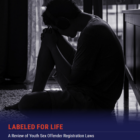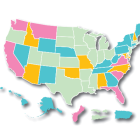
Supported by lawmakers, opposed by reformers, youth sex offender registries have a long history
|
Originally, registries were conceived as a way to inform communities about convicted sexual predators living in their neighborhoods. But researchers, conducting several different studies over the years, have largely determined that putting minors on registries does not enhance community safety and reflects a miscarriage of justice that runs afoul of the juvenile justice system’s promise to help rehabilitate youth.





